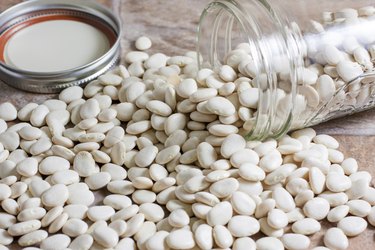
Whether kidney, lima, pinto or black, beans deserve a place in your healthy diet. They're naturally low in fat, high in fiber, rich in antioxidants and dense in minerals such as iron, zinc, calcium and selenium as well as the B vitamin folate. Beans contain good carbohydrates, and if you're like most Americans, you can use healthier carbohydrates in your diet. Many Americans consume a diet high in highly refined or processed carbs.
Rich in Fiber
Video of the Day
Beans contain a rich source of fiber, a type of carbohydrate that contributes to your health. You get two types of fiber from your diet -- soluble and insoluble. Beans contain both. Soluble fiber attracts water and forms a gel during digestion. Its action promotes healthy glucose and cholesterol levels. Insoluble fiber doesn't dissolve in water; instead, it acts as roughage, moving food through your digestive system, softening and bulking up stool. Its action helps relieve constipation and promote regularity. Beans provide about 8 grams of fiber per 1/2-cup cooked serving.
Video of the Day
Contains Glycemic-Friendly Carbohydrates
Beans are low glycemic and contain complex carbohydrates. The glycemic index measures how rapidly and drastically a carbohydrate food raises your blood sugar. Low-glycemic foods, such as beans, move through the digestive system slowly. This causes a gradual increase in blood sugar and provides sustained energy, as opposed to high-glycemic foods, which cause a sharp increase followed by a quick decline in blood sugar. For this reason, beans are a good option for those needing to keep their blood sugar stable.
Provides a Complementary Source of Protein
Beans possess an unusual feature. Unlike many carbohydrate foods in your diet, beans also provide a good source of protein. A 1/2-cup serving of cooked beans provides about 8 grams of protein on average, according to the University of Michigan Health System. Protein is an essential macronutrient that plays a role in the growth and maintenance of your body. For this reason, you can count beans toward either your daily vegetable or protein intake.
Making Beans a Part of Your Diet
Beans provide an inexpensive, versatile and nutritious food option. You can have beans as a side dish with your meal, add them to a salad, enjoy them on their own as a snack or use them as a main dish. Consider having beans in a dish in place of meat one or two days each week. You can also add them to soups or make bean dip to snack on. Experiment with different recipes such as bean burritos, bean tacos and three-bean casserole.